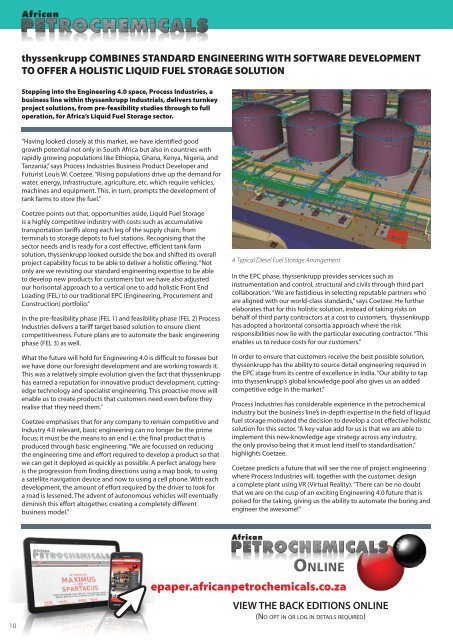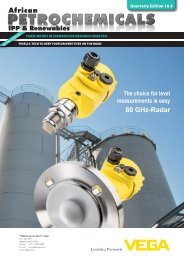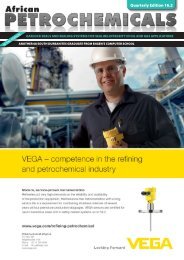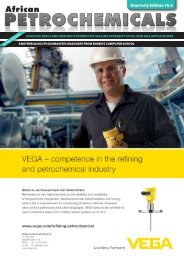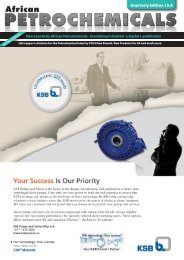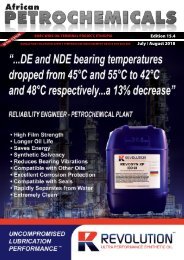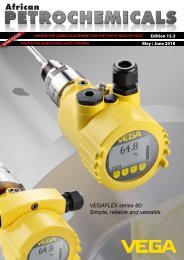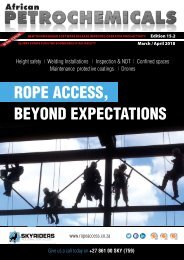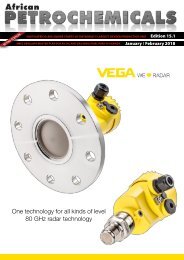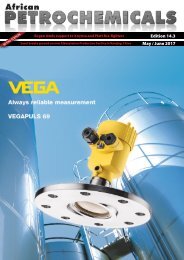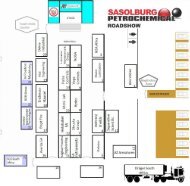African Petrochemicals- 16.1 2019
Create successful ePaper yourself
Turn your PDF publications into a flip-book with our unique Google optimized e-Paper software.
thyssenkrupp COMBINES STANDARD ENGINEERING WITH SOFTWARE DEVELOPMENT<br />
TO OFFER A HOLISTIC LIQUID FUEL STORAGE SOLUTION<br />
Stepping into the Engineering 4.0 space, Process Industries, a<br />
business line within thyssenkrupp Industrials, delivers turnkey<br />
project solutions, from pre-feasibility studies through to full<br />
operation, for Africa’s Liquid Fuel Storage sector.<br />
“Having looked closely at this market, we have identified good<br />
growth potential not only in South Africa but also in countries with<br />
rapidly growing populations like Ethiopia, Ghana, Kenya, Nigeria, and<br />
Tanzania,” says Process Industries Business Product Developer and<br />
Futurist Louis W. Coetzee. “Rising populations drive up the demand for<br />
water, energy, infrastructure, agriculture, etc. which require vehicles,<br />
machines and equipment. This, in turn, prompts the development of<br />
tank farms to store the fuel.”<br />
Coetzee points out that, opportunities aside, Liquid Fuel Storage<br />
is a highly competitive industry with costs such as accumulative<br />
transportation tariffs along each leg of the supply chain, from<br />
terminals to storage depots to fuel stations. Recognising that the<br />
sector needs and is ready for a cost effective, efficient tank farm<br />
solution, thyssenkrupp looked outside the box and shifted its overall<br />
project capability focus to be able to deliver a holistic offering. “Not<br />
only are we revisiting our standard engineering expertise to be able<br />
to develop new products for customers but we have also adjusted<br />
our horisontal approach to a vertical one to add holistic Front End<br />
Loading (FEL) to our traditional EPC (Engineering, Procurement and<br />
Construction) portfolio.”<br />
In the pre-feasibility phase (FEL 1) and feasibility phase (FEL 2) Process<br />
Industries delivers a tariff target based solution to ensure client<br />
competitivesness. Future plans are to automate the basic engineering<br />
phase (FEL 3) as well.<br />
What the future will hold for Engineering 4.0 is difficult to foresee but<br />
we have done our foresight development and are working towards it.<br />
This was a relatively simple evolution given the fact that thyssenkrupp<br />
has earned a reputation for innovative product development, cuttingedge<br />
technology and specialist engineering. This proactive move will<br />
enable us to create products that customers need even before they<br />
realise that they need them.”<br />
Coetzee emphasises that for any company to remain competitive and<br />
Industry 4.0 relevant, basic engineering can no longer be the prime<br />
focus; it must be the means to an end i.e. the final product that is<br />
produced through basic engineering. “We are focussed on reducing<br />
the engineering time and effort required to develop a product so that<br />
we can get it deployed as quickly as possible. A perfect analogy here<br />
is the progression from finding directions using a map book, to using<br />
a satellite navigation device and now to using a cell phone. With each<br />
development, the amount of effort required by the driver to look for<br />
a road is lessened. The advent of autonomous vehicles will eventually<br />
diminish this effort altogether, creating a completely different<br />
business model.”<br />
A Typical Diesel Fuel Storage Arrangement<br />
In the EPC phase, thyssenkrupp provides services such as<br />
instrumentation and control, structural and civils through third part<br />
collaboration. “We are fastidious in selecting reputable partners who<br />
are aligned with our world-class standards,” says Coetzee. He further<br />
elaborates that for this holistic solution, instead of taking risks on<br />
behalf of third party contractors at a cost to customers, thyssenkrupp<br />
has adopted a horizontal consortia approach where the risk<br />
responsibilities now lie with the particular executing contractor. “This<br />
enables us to reduce costs for our customers.”<br />
In order to ensure that customers receive the best possible solution,<br />
thyssenkrupp has the ability to source detail engineering required in<br />
the EPC stage from its centre of excellence in India. “Our ability to tap<br />
into thyssenkrupp’s global knowledge pool also gives us an added<br />
competitive edge in the market.”<br />
Process Industries has considerable experience in the petrochemical<br />
industry but the business line’s in-depth expertise in the field of liquid<br />
fuel storage motivated the decision to develop a cost effective holistic<br />
solution for this sector. “A key value add for us is that we are able to<br />
implement this new-knowledge age strategy across any industry,<br />
the only proviso being that it must lend itself to standardisation,”<br />
highlights Coetzee.<br />
Coetzee predicts a future that will see the rise of project engineering<br />
where Process Industries will, together with the customer, design<br />
a complete plant using VR (Virtual Reality). “There can be no doubt<br />
that we are on the cusp of an exciting Engineering 4.0 future that is<br />
poised for the taking, giving us the ability to automate the boring and<br />
engineer the awesome!”<br />
10<br />
Online<br />
epaper.africanpetrochemicals.co.za<br />
VIEW THE BACK EDITIONS ONLINE<br />
(No opt in or log in details required)


